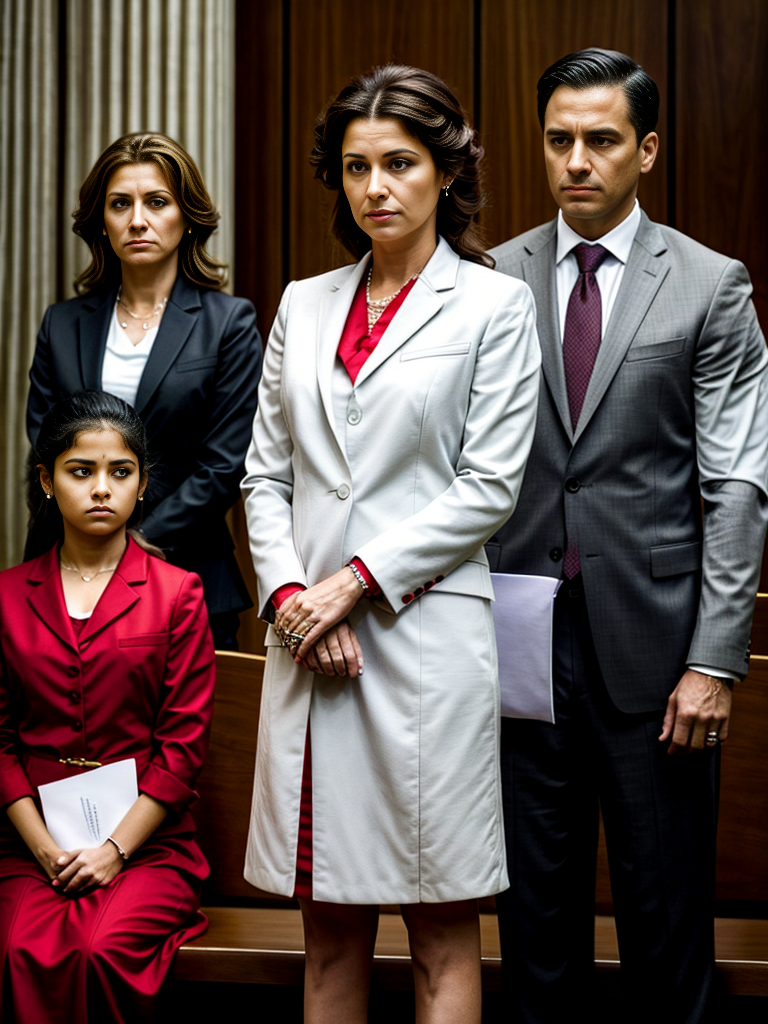Mothers on Trial: The Silent Shaming of Sex Workers in Custody Battles

When she found out that she was pregnant, Emma* felt a mixture of joy and apprehension. As a single mother with two older children, she knew the challenges that lay ahead. But this time was different; this time, her circumstances had changed.
Emma had been working as a sex worker for several years, and while it wasn’t her dream job, it provided the financial stability that she needed. She was able to support herself and her children, pay the bills, and put food on the table.
But now, with a baby on the way, Emma began to question whether sex work was a viable option for her future. She worried about how society would judge her as a mother if they discovered her line of work. She feared that she could lose custody of her children or face discrimination from social services.
Emma made the difficult decision to leave sex work behind and find alternative employment. It wasn’t an easy transition, but she was determined to do whatever it took to provide a stable and secure environment for her growing family.
Emmas story is not unique. Many mothers who are also sex workers face similar dilemmas when it comes to their children and custody battles with their fathers. They find themselves caught in a web of slut-shaming and discrimination that can have devastating consequences for their families.
The Stigma of Sex Work
Sex work is one of the oldest professions in human history. It has existed in various forms across cultures and societies throughout time. However, despite its prevalence, sex work continues to be stigmatized and marginalized in many parts of the world.
The stigma surrounding sex work is deeply rooted in cultural norms and moral judgments about sexuality and gender roles. Sex workers are often portrayed as immoral or deviant individuals who are engaged in illicit activities for personal gain.
This negative portrayal not only perpetuates harmful stereotypes but also contributes to the marginalization and discrimination faced by sex workers on a daily basis.
In many countries, sex work is criminalized or heavily regulated, which further adds to the stigma and discrimination experienced by those involved in the industry. Sex workers are often subjected to harassment, violence, and exploitation, both from clients and law enforcement officials.
The Impact on Mothers
For mothers who are also sex workers, the stigma and discrimination they face can have serious consequences for their families. They may be subjected to slut-shaming and moral judgments that question their fitness as parents.
This slut-shaming often takes the form of derogatory language and stereotypes that seek to dehumanize and degrade sex workers. They may be labeled as whores, sluts, or bad mothers who are putting their own selfish desires ahead of the needs of their children.
These negative portrayals not only perpetuate harmful stereotypes but also undermine the rights and dignity of sex workers as individuals. They suggest that a persons worth as a parent is determined by their occupation or personal choices rather than their ability to love and care for their children.
Mothers who are also sex workers may face additional challenges when it comes to custody battles with their children’s fathers. They may be subjected to biased judgments from family court judges who hold negative attitudes towards sex work.
These judges may view sex work as evidence of immoral behavior or an unhealthy environment for raising children. They may assume that sex workers are more likely to engage in risky behaviors or expose their children to harm.
As a result, these mothers may find themselves at a disadvantage when it comes to securing custody or visitation rights with their children. They may be required to prove that they are fit and capable parents despite working in the sex industry.
This burden of proof can be incredibly difficult for mothers who are also sex workers. They may face invasive questioning about their personal lives, sexual history, or work conditions. They may be required to provide character references or undergo psychological evaluations.
All of these requirements can create a hostile and judgmental environment that is stacked against these mothers from the start. They may feel as though they are constantly on trial, forced to defend their choices and prove their worth as parents.
The Role of the Courts
So why do courts side with fathers against mothers in the sex industry? There are several factors that contribute to this bias, including societal attitudes towards sex work, gender stereotypes, and the best interests of the child standard.
Societal Attitudes: As previously mentioned, sex work is heavily stigmatized in many societies. It is often associated with immorality, deviance, and criminal behavior. These negative attitudes can influence how judges perceive sex workers in custody cases.
Gender Stereotypes: Gender stereotypes also play a role in how courts view mothers who are also sex workers. Women are often expected to be nurturing caregivers who prioritize their children’s needs above all else. When women engage in behaviors that challenge these traditional gender roles, such as sex work, they may be judged more harshly by the courts.
Best Interests of the Child Standard: In most jurisdictions, family court judges use the best interests of the child standard when making custody determinations. This standard requires judges to consider what arrangement will promote the child’s health, safety, and overall well-being.
While this standard is intended to protect children from harm and ensure their welfare, it can be subjective and open to interpretation. Judges may have different opinions about what constitutes a healthy or safe environment for raising children.
In some cases, judges may believe that sex work is inherently harmful or risky for children. They may view it as evidence of an unstable or unhealthy lifestyle that could negatively impact a child’s development.
However, it is important to note that there is no empirical evidence to support these assumptions. Numerous studies have shown that children raised by sex workers do not experience any significant differences in their well-being compared to children raised by non-sex workers.
In fact, some research suggests that children of sex workers may actually benefit from their mothers occupation. They may have access to more financial resources, social support networks, and educational opportunities as a result.
Is This Is a Problem?
The bias against mothers who are also sex workers in custody battles is not only unfair but also harmful to the well-being of children and families. It perpetuates harmful stereotypes and discrimination that can have long-lasting consequences for these individuals.
When courts side with fathers against mothers in the sex industry, they send a message that sex work is incompatible with motherhood. They reinforce the idea that women who engage in this line of work are unfit or incapable of providing a safe and nurturing environment for their children.
This type of judgment not only undermines the rights and dignity of sex workers as individuals but also denies children the opportunity to grow up in a loving and supportive family environment.
Children should never be used as pawns in a battle between parents or punished for their mothers occupation. They deserve to be protected from harm and provided with the care and support they need to thrive.
By stigmatizing and marginalizing mothers who are also sex workers, we are failing to meet this responsibility. We are perpetuating harmful stereotypes and discrimination that do more harm than good.
A Better Way Forward
So what can be done to address this issue? How can we ensure that mothers who are also sex workers receive fair treatment in custody battles?
First and foremost, we need to challenge the stigma surrounding sex work. We need to recognize that it is a legitimate form of labor that should be decriminalized and destigmatized.
Sex workers deserve the same rights, protections, and respect as any other worker. They should not be judged or discriminated against based on their occupation or personal choices.
Secondly, we need to educate judges, lawyers, social workers, and other professionals involved in family court proceedings about the realities of sex work. We need to provide them with accurate information and research that challenges the assumptions and biases they may hold.
By increasing awareness and understanding of sex work, we can help to dispel myths and misconceptions that contribute to the discrimination faced by mothers in the industry.
Finally, we need to ensure that custody determinations are based on the best interests of the child standard rather than personal judgments or biases. This means taking into account all relevant factors, including a parents ability to provide love, care, and support for their children.
Mothers who are also sex workers should not face trial by slut-shaming in custody battles with their children’s fathers. They should not be judged or discriminated against based on their occupation or personal choices.
Instead, they deserve to be treated with dignity and respect as individuals and parents. They deserve a fair chance to prove their worth and secure custody or visitation rights with their children.
By challenging the stigma surrounding sex work, educating professionals about its realities, and ensuring that custody determinations are based on the best interests of the child standard, we can help to create a more just and equitable system for these families.
*Name has been changed for privacy reasons.
